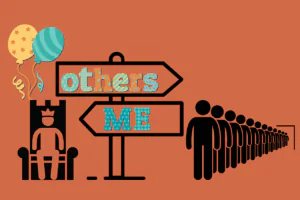With inflation on the rise, you may be concerned about money. Perhaps you’re not going out to dinner as often. Maybe you’re considering taking on a second job in order to cover your bills. Or perhaps you’re delaying expensive repairs to your car and hoping it doesn’t break down. It can be nerve-wracking and worrisome. In fact, you may be wondering how to deal with Financial Anxiety.
In the American Psychological Association’s 2022 Stress in America Survey, 87 percent of respondents listed inflation as a source of significant stress. No other single issue has caused this much stress since the survey began in 2007.
You’re more likely to feel stressed or anxious about money if you have experienced certain conditions in your life. One is a history of deprivation. If you’ve ever gone without food or housing, you might feel compelled to go to extreme lengths to save resources in case you need them later. Another condition is low or unsteady income. If you live paycheck to paycheck, you probably don’t have a savings account or home equity to fall back on in emergencies. Any delay in payment might keep you from buying food or putting enough gas in your car to get to work.
How Financial Anxiety Can Affect You
Sometimes Financial Anxiety can be significant enough to trigger physiological survival responses. One of those survival responses is the automatic redirecting of blood flow away from the cerebral cortex, the “thinking” part of the brain, into parts of the brain and body that help you survive: large muscle groups to fight and flee and the sub-cortical parts of the brain that drive fight, flight, and freeze. The upshot? If Financial Anxiety has triggered your survival responses, you might not make the best decisions.
How might that play out? One example is if your debts and expenses seem impossible to conquer, you might consider gambling as an option for getting the money you need. That survival instinct makes you overlook the fact that whatever gambling platform you use, the odds are designed to not be in your favor. So, the combination of gambling and anxiety can make matters worse by further destabilizing your finances.
Another example is if feelings of anxiety about money become overwhelming, you might turn to alcohol or other substances to cope. Alcohol and drugs may offer a temporary distraction from things you don’t want to think about, but those substances won’t help you address the real problems triggering those feelings.
Money can represent security, safety, and comfort. If you constantly live with money in scarce supply, thoughts about providing for basic needs can be all-consuming. Those thoughts drive chronic worry, anxiety, fear, and general distress. This stress can have negative long-term effects on mental health, especially for people with an underlying mental health condition. For example, stress can trigger mania or depression in people with bipolar disorder. A 2022 review of forty studies that examined the link between financial stress and depression in adults concluded that there is an association between financial stress and depression.
Money Disorders
Another cause of Financial Anxiety can be long-standing, maladaptive patterns in your relationship with money. Sometimes these patterns have a significant enough impact on your life that they cross over into being a disorder.
“Money Disorders are recurring issues with your finances that negatively affect your life”, according to Dr. Judith Overton, psychiatrist and medical director for Blue Cross Blue Shield of Tennessee. There are three categories of money disorders: avoidance, worshipping, and relational.
Avoidance involves distancing yourself from money. Avoidance can involve underspending, where you have such an intense hatred of money that your living conditions are unfit because you refuse to buy the basics. Another type of avoidance is financial denial, where you minimize money problems by refusing to think about your finances at all. A final type is financial rejection, where you feel guilty about having any money and give it away at any opportunity.
Money worshippers can’t ever have enough wealth and they believe that getting more will solve all their problems. This condition lends itself to the development of pathological gambling and becoming a workaholic. Money worshippers may hoard money because it’s the only thing that makes them feel safe and secure.
Relational money disorders involve family or friends. For example, you may have Financial Dependence and refuse to take responsibility for your finances. Instead, you rely on others to manage money for you. Another example is Financial Infidelity, where you may lie to your partner about money or hide financial transactions.
Financial Distress Help
Finally, debt can be a big source of Financial Anxiety. In these inflationary times, you may not be able to easily eliminate debt, but knowing how much you have and putting a plan in place to reduce it can help lessen feelings of stress and anxiety. Nonprofit credit counseling groups such as Money Management International or Greenpath provide free advice on managing money and debts. They often have free educational materials or workshops.
Many people hide financial issues because they feel embarrassed or blame themselves for their situation. Problems of any kind tend to be less frightening when you face them as a group. If you’re unable to talk to friends or family, join a support group.
When money anxiety causes lasting distress and begins to affect your daily life, you may want to seek support from a mental health professional. Many therapists offer sliding scale fees so that people who can’t otherwise afford therapy can still access support. A therapist can help you to address past trauma around money or deprivation. They can also help you identify and address depression, anxiety, and any other concerns such as difficulty discarding unneeded items or increased substance use. In addition, they can help you to let go of shame or guilt around past financial mistakes or difficulties.
If you’re in northern Illinois, therapists at Life Care Wellness can help you overcome Financial Anxiety. Please reach out to us in our Glen Ellyn, Chicago (Jefferson Park), Sycamore, or Yorkville locations.
Rhonda Kelloway is the owner and principal therapist at Life Care Wellness, a group psychotherapy practice in Glen Ellyn, Sycamore, Chicago (Jefferson Park neighborhood), and Yorkville, Illinois. She is a trauma specialist utilizing a Somatic Experiencing framework to utilize the body’s wisdom in healing. She also uses EMDR and a variety of traditional psychotherapy approaches in her work. In addition to being a psychotherapist, she is a trained divorce and family mediator.





